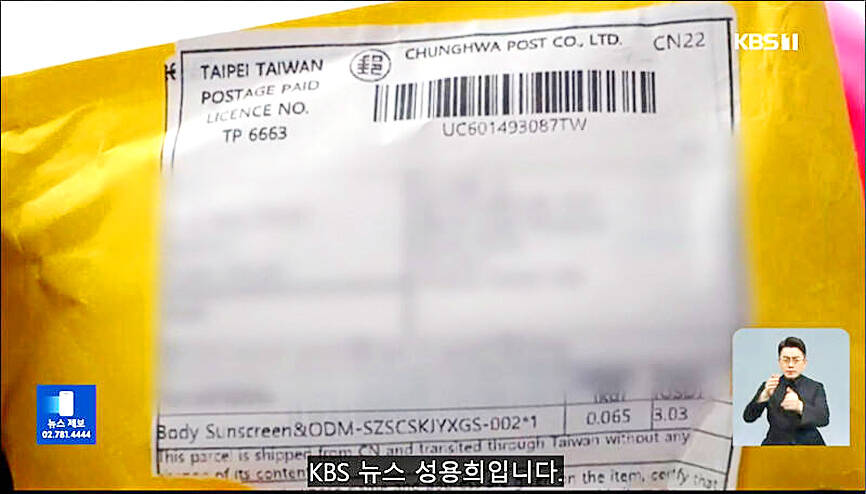A suspicious package that had been sent from Taiwan to a South Korean care home was found to have originated in China, the Taipei Mission in Korea said on Friday.
Based on information provided by Taiwan’s Customs Administration, the package was confirmed to have been sent from China and transshipped to South Korea by Taiwan’s state-run postal service Chunghwa Post Co, the mission said in a statement.
The Taipei mission said it will continue to work with South Korean authorities on the matter and share the results of the probe with the police and other agencies in the country.

Photo: Screen grab from Korean Broadcasting System
The incident was discovered after three Ulsan care home staffers who opened the package on Thursday began experiencing dizziness and difficulty breathing, and they were subsequently hospitalized for treatment.
The package has since been handed over to the South Korean Agency for Defense Development for further examination.
The package had been sent by surface mail from China, then sorted through Chunghwa Post’s freight forwarding center during a stopover in Taiwan, Taiwan’s Criminal Investigation Bureau (CIB) said.
Without entering customs, it was later transshipped directly to South Korea via air mail, the CIB said.
POLICE WARNING
In a Yonhap News Agency report yesterday, South Korean police called for vigilance against suspicious international parcels, saying that such packages could be yellow or black, and they could have “Chunghwa Post” written on them.
The sender could be Post Office Box 100561-003777, Taipei, Taiwan, the report said.
Chunghwa Post has provided information to South Korean authorities after it was informed of the matter, the Chunghwa’s deputy chief of mail business and operations Lin Li-fu (林立富) said.
Lin said the company has temporarily suspended transshipping packages destined for South Korea from freight forwarders, as the police investigation continues.
Due to China’s insufficient postal capacity, international packages from that country often go through Taiwan before being forwarded to their final destination, the company said.

The High Prosecutors’ Office yesterday withdrew an appeal against the acquittal of a former bank manager 22 years after his death, marking Taiwan’s first instance of prosecutors rendering posthumous justice to a wrongfully convicted defendant. Chu Ching-en (諸慶恩) — formerly a manager at the Taipei branch of BNP Paribas — was in 1999 accused by Weng Mao-chung (翁茂鍾), then-president of Chia Her Industrial Co, of forging a request for a fixed deposit of US$10 million by I-Hwa Industrial Co, a subsidiary of Chia Her, which was used as collateral. Chu was ruled not guilty in the first trial, but was found guilty

DEADLOCK: As the commission is unable to forum a quorum to review license renewal applications, the channel operators are not at fault and can air past their license date The National Communications Commission (NCC) yesterday said that the Public Television Service (PTS) and 36 other television and radio broadcasters could continue airing, despite the commission’s inability to meet a quorum to review their license renewal applications. The licenses of PTS and the other channels are set to expire between this month and June. The National Communications Commission Organization Act (國家通訊傳播委員會組織法) stipulates that the commission must meet the mandated quorum of four to hold a valid meeting. The seven-member commission currently has only three commissioners. “We have informed the channel operators of the progress we have made in reviewing their license renewal applications, and

Taiwan People’s Party (TPP) Chairman Huang Kuo-chang (黃國昌) yesterday appealed to the authorities to release former Taipei mayor Ko Wen-je (柯文哲) from pretrial detention amid conflicting reports about his health. The TPP at a news conference on Thursday said that Ko should be released to a hospital for treatment, adding that he has blood in his urine and had spells of pain and nausea followed by vomiting over the past three months. Hsieh Yen-yau (謝炎堯), a retired professor of internal medicine and Ko’s former teacher, said that Ko’s symptoms aligned with gallstones, kidney inflammation and potentially dangerous heart conditions. Ko, charged with

Taiwan-based publisher Li Yanhe (李延賀) has been sentenced to three years in prison, fined 50,000 yuan (US$6,890) in personal assets and deprived political rights for one year for “inciting secession” in China, China's Taiwan Affairs Office spokesman Chen Binhua (陳斌華) said today. The Shanghai First Intermediate People’s Court announced the verdict on Feb. 17, Chen said. The trial was conducted lawfully, and in an open and fair manner, he said, adding that the verdict has since come into legal effect. The defendant reportedly admitted guilt and would appeal within the statutory appeal period, he said, adding that the defendant and his family have